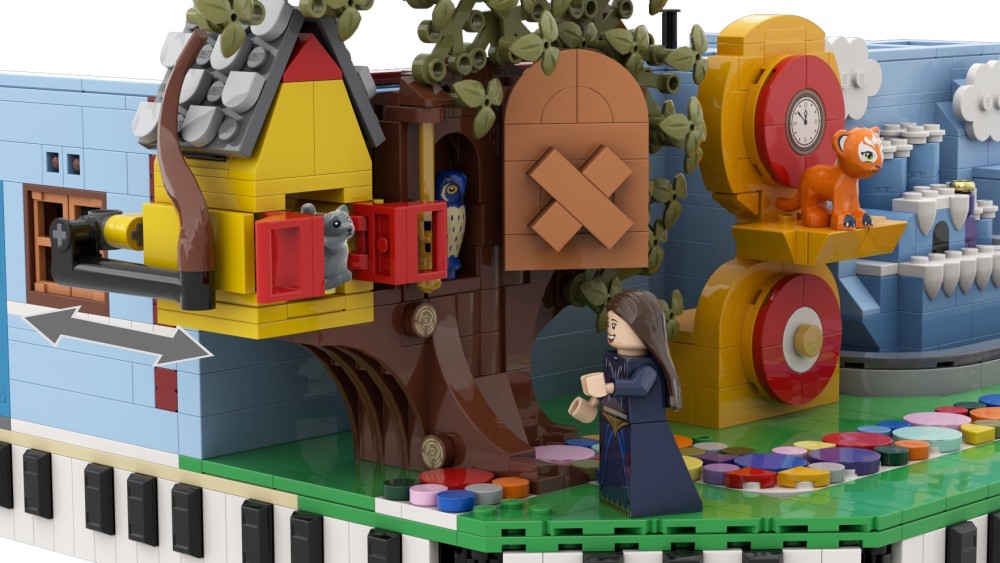Mister Rogers Lego prototype a tribute to his ‘deep spiritual resonance’

A sample look at the Lego set inspired by Mister Rogers, including arrows showing how different parts of the Lego kit move. (Courtesy of Matt Smith)
When Matt Smith introduced his toddler to television in 2022, he selected the show that brought him warmth and comfort when he was growing up in the 1990s: Mister Rogers’ Neighborhood.
Now, the long-running children’s show that once graced the screens of more than 3.5 million televisions a week could again become a household fixture, this time in the form of a Lego set.
Smith, a 31-year-old alumnus of Princeton Theological Seminary currently on sabbatical from his PhD program in American history, built a Mister Rogers Lego prototype that features Mister Rogers’s living room and kitchen on one side and the Neighborhood of Make-Believe on the other.
The design includes exactly 1,968 pieces in honor of the show’s 1968 premiere, complete with a red trolley, fish tank, King Friday’s Castle, and a green sweater hanging in a closet.
“Mister Rogers brings out the best in humanity,” said Smith, who added that he hopes his design is a tribute to Rogers’s cross-generational, nondenominational appeal. “He had a gift for meeting each person where they were and giving everything he had to them in their interaction.”
During the pandemic, Smith turned to Legos as a safe, tactile creative outlet. After he introduced his 3-year-old to Mister Rogers, Smith’s wife suggested the idea of a Mister Rogers Lego design. Beginning in August 2022, Smith used Lego bricks from existing sets to design a physical prototype, watching episodes of the show in the background and using photos of the set for reference.
He completed the design using Lego’s free digital design software, and after roughly 125 hours, Smith launched the prototype as a project idea on the Lego website on May 16.
Mister Rogers’ Neighborhood, which ran from 1968 until 2001, included 895 episodes hosted by Fred Rogers, who also created the show’s hundreds of original songs and 14 puppet characters. The show was groundbreaking both for taking children seriously and for tackling taboo topics, including divorce, death, and war.
Smith’s design pays homage to the show’s bold approach by including the kiddie pool that Fred Rogers and officer François Clemmons soaked their feet in during a now-famous 1969 episode. The episode was shot during a time when racially integrated pools were controversial; it was only in December of that year that the Supreme Court ruled swimming pools couldn’t be segregated by race.
“It is undeniable that he contributed to the cultural conversation around race at pools,” said Smith. He added that while Rogers isn’t responsible for the Supreme Court decision, “I don’t think it’s an accident that seven months after the face of White, wholesome children’s television did this subversive act . . . that the Supreme Court ruled you cannot deny pool access based on race.”
Smith’s design includes other Easter eggs for the Mister Rogers mega-fans, including a blue-tipped paintbrush that nods to when the show’s living room set was repainted from brown to blue, as well as the show’s signature red trolley. Turning a small crank sends the trolley through the walls of the living room to the Neighborhood of Make-Believe, which is on the reverse side of the Lego set.
In addition to Fred Rogers, the set includes figures of deliveryman Mr. McFeely, Lady Aberlin and Clemmons, along with miniatures of Daniel Tiger, X the Owl, Henrietta, and King Friday.
Smith said the set is in some sense aimed at AFOLs (adult fans of Legos) who have a disposable income to spend on a nostalgic Lego design. But, he added, Lego transcends culture, age, and language. “Families, parents and children and caregivers, can visit the set together, build it together, and enjoy reliving the memories and creating new memories of Mister Rogers.”
A Christian known to pray for people by name during his early morning devotions, Rogers started attending Pittsburgh Theological Seminary during his lunch hours in 1955 while working on The Children’s Corner, a TV show and precursor to Mister Rogers’ Neighborhood. He was ordained by the Presbyterian Church (USA) in 1963 with a special charge to serve families and children through television. He and his wife, Joanne Rogers, attended Sixth Avenue Presbyterian Church in Pittsburgh’s Squirrel Hill neighborhood.
Staff members of the show were close-knit, and many “thought of themselves as sort of a church congregation,” The New York Times reported in 2001, though Rogers was never explicit about his faith on the program. “He wanted to be inclusive, and there are many, many people you would exclude if you start mentioning one God, one faith,” Joanne Rogers, who died in 2021, said in a 2019 interview.
“I think that he acted his faith, always, as much as he possibly could."
Lego design ideas require 100 votes in the first 60 days or the idea is killed, and need 10,000 total votes to be considered for production. In the first two weeks, Smith’s design has earned over 5,380 votes.
“I think the reception of this tribute to him . . . is a testament not to me, but to the deep spiritual resonance that his ministry of kindness, gentleness, love, and acceptance brought to people all over the country and the world,” Smith said. —Religion News Service




